UK Ancestry Visa
The UK Ancestry visa allows Commonwealth, citizens of Zimbabwe and British Overseas citizens with a grandparent who was born in the UK (or the Channel Islands or the Isle of Man) to live, work and study in the UK.
Services
Expert Assistance for UK Ancestry Visa
UK Ancestry Visa Applications
Maximise the chance of a successful outcome with expert help to prepare and submitting your UK Ancestry Visa application.
Number of people assisted
5,000 +
Languages spoken
10 +
Years of experience
15 +
How to Apply for the UK Ancestry Visa
Step 1
Eligibility Check
Step 2
Prepare Documents
Step 3
Complete the Application Form
Step 4
Pay the Relevant Fees
Step 5
Submit Biometric Data
Step 6
Submit Supporting Documents
Step 7
Await Decision
Step 8
Receive a Decision
Ancestry Visa Video
UK Ancestry Visa Quiz
Find our more about UK Ancestry Visa in this quiz
UK Ancestry Visa
UK Ancestry visa application fees apply to each applicant, including any dependents added to the applicants.
Apply Outside UK
£682
Additional fees
£5175
Immigration Health Surcharge (Adult)

Immigration Health Surcharge
Additional Costs
Visa Duration
Key Takeaways
The UK Ancestry Visa is available to Commonwealth citizens with a grandparent born in the UK, Channel Islands, Isle of Man, or Ireland before 31 March 1922. Applicants must be over 17, able to work, and financially support yourselves without public funds. The online application must include proof of ancestry, financial stability, and intent to work in the UK.
The visa is initially granted for 5 years, after which holders can apply for an extension or Indefinite Leave to Remain (ILR), provided they meet the requirements, such as continuous residence, employment, and passing the "Knowledge of Language and Life in the UK" test.
Visa holders can bring eligible family members (spouses, civil partners, unmarried partners, dependent children) to the UK. Family members must meet maintenance requirements and apply either simultaneously or separately. If requirements continue to be met, extensions are possible for an additional 5 years.
The application fee for the UK Ancestry Visa is £637, with an additional annual Immigration Health Surcharge of £1,035. If applied from outside the UK, processing typically takes 3 weeks, with faster decisions possible via priority services.
Table of contents
Share
What is The UK Ancestry Visa?
The UK Ancestry Visa is a potential entry route for descendants of UK nationals. It is available to Commonwealth citizens with one grandparent born in the UK, the Channel Islands, the Isle of Man, or Ireland before 31 March 1922.
The visa enables successful applicants the right to reside, work, and pursue academic studies in the United Kingdom for an initial duration of 5 years. Eligible individuals can prolong their visa for another 5 years or seek Indefinite Leave to Remain (ILR) upon meeting the stipulated criteria.
Unmarried Parents or Adopted Children
You can be eligible if your parents or grandparents were not legally married. However, you cannot claim ancestry from:
- A step-parent or step-grandparent
- A grandparent born in a British colony
- A grandparent born on an overseas military base
You also cannot qualify based on having a great-grandparent or a more distant ancestor born in the UK or its Islands.
You are eligible if you or your parents were legally adopted outside of the UK, on the condition that the adoption process is acknowledged as valid under the laws of the United Kingdom.
For further guidance on valid adoptions, please refer to government resources.
Visa Pathway
Indefinite Leave to Remain (ILR)
The UK Ancestry Visa is a route to settlement in the UK. Once you have held the visa for 5 years, assuming you continue to meet the eligibility requirements, you should be able to apply for Indefinite Leave to Remain (ILR). ILR is not granted automatically. Therefore, you must submit a complete application. If granted ILR, you can settle in the UK permanently without any time restrictions. If you have family members under the Ancestry Dependent Visa, they may apply for Indefinite Leave to Remain simultaneously.
Applying for ILR
- Application Process: Complete the ILR application online. It is best to apply up to 28 days before you complete the full 5 years' UK residence.
- Biometric Information: Schedule an appointment at your local UKVCAS office to have your photo, signature, and fingerprints taken.
Eligibility Criteria for ILR
- UK Residence: Demonstrate that you have spent 5 years continuously in the UK under the Ancestry Visa route, without absences of over 180 days in any 12 months' period.
- Financial Stability: Prove you have enough funds to support yourself and your dependents.
- Employment: Show that you have been working in the UK.
- Commonwealth Citizenship: Confirm that you are still a Commonwealth citizen.
- Knowledge and Language: Pass the "Knowledge of Language and Life in the UK" test and meet the English language requirement (e.g. CEFR level B1 in speaking and listening).
British Citizenship
After holding a UK Ancestry Visa for 5 years, you can apply for Indefinite Leave to Remain (ILR). Once you obtain ILR and continue to meet the eligibility criteria, you can qualify for British citizenship and apply for a British passport. If you are married to or in a civil partnership with a British citizen, you can apply for ILR immediately. Alternatively, waiting for 1 year before applying would be best.
Switching Visas
You cannot switch to the UK Ancestry Visa if you have entered the UK on a different visa. You must apply for Entry Clearance from abroad before entering the UK as an Ancestry Visa holder.
You can apply as early as 3 months before your intended travel date. At the time of application, you must meet several requirements and prove your UK ancestry.
Partner and Family Applications
Under the immigration rules for the UK Ancestry Visa, you can bring Family Dependents with you to reside in the UK. Eligible family members include:
- Civil partners
- Unmarried partners (2 years' durable akin to marriage or civil partnership)
- Spouses
- Dependent minor children
Partners and children below the age of 18 may apply at the same time or join you later in the UK.
If you are applying for a UK Ancestry Dependent Visa for family members, you must demonstrate that you can meet adequate maintenance and accommodation requirements without recourse to public funds. You must prove you can support and maintain your partner and dependents without claiming benefits.
Ideally, you and your Dependents should submit your applications simultaneously to travel to the UK together. Nevertheless, family members can apply later and travel separately.
Partners already in the UK who entered on a Short-term Student Visa, Seasonal Worker Visa, Parent of a Child Student Visa, Domestic Worker Visa or Visitor Visa are not eligible to apply to reside with you. The same restriction applies if your partner has been granted immigration bail or temporary permission to stay outside the immigration rules.
If you are the Dependent of someone with a UK Ancestry Visa, you must apply online. For applications for leave to enter or leave to remain, your partner must submit biometric information by attending a visa application centre or via the ID Verification app, which includes a digital photograph and fingerprints. Appointments for visa application are scheduled at a visa application centre in the applicant's home country.
If individuals are switching their current visa in the UK, they can have their biometric data taken at a UKVCAS service point.
Interesting fact - Once the Main Applicant qualifies for Indefinite Leave to Remain upon completion of the 5 years' UK residence, the Dependents may also apply for Indefinite Leave to Remain at the same time without having to complete the full 5 years.
Requirements & Eligibility
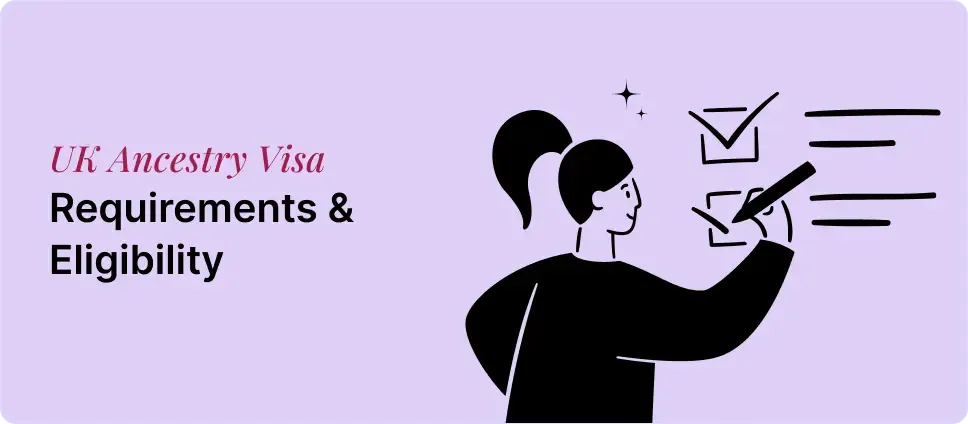
To ensure eligibility for the UK Ancestry Visa, it is highly recommended that you conduct thorough research into your family tree. The key eligibility criteria are:
- Be over the age of 17.
- Be able and intend to work in the UK.
- Be able to financially support yourself and any dependents without needing public funds.
You should be at least 17 years old by the time you plan to travel to the UK. If you are aged 17 but have not turned 18, the Ancestry Visa application will require your parents' consent for you to proceed.
As long as you are willing and able to continue working, there is no maximum age limit.
Family Ties
To be eligible for this visa, you will need to show that you have one grandparent born either:
- In the UK
- In the Channel Islands (Bailiwick of Guernsey or Bailiwick of Jersey)
- In the Isle of Man
- In what is now Ireland (before 31 March 1922)
- On a British-owned or registered ship or aircraft if the requirements of either section 50(7)(a) of the British Nationality Act 1981, or section 32(5) of the British Nationality Act 1948, as applicable, are met
You will be required to provide supporting documents to evidence your claims regarding the above; please see below.
Commonwealth Citizen Requirements:
You must be able to prove that you are a Commonwealth citizen at the time you make the application. Therefore you should be either:
- A British Overseas Territories citizen (BOTC)
- British Overseas Territories citizenship (previously called British Dependent Territories citizenship before 26 February 2002) is granted to individuals connected to British overseas territories through birth, descent, or marriage.
- If born before 1983, you became a BOTC if you were a citizen of the UK and Colonies with ties to a British overseas territory.
- If you were born after 1983 in a British overseas territory to a BOTC parent or legally settled parent, you are a BOTC. Unmarried parents' children can apply for BOTC status and British citizenship.
- The qualifying territories are:
- Anguilla
- Bermuda
- British Antarctic Territory
- British Indian Ocean Territory
- British Virgin Islands
- Cayman Islands
- Falkland Islands
- Gibraltar
- Montserrat
- Pitcairn Islands
- Saint Helena, Ascension and Tristan da Cunha
- South Georgia and the South Sandwich Islands
- Turks and Caicos Islands
- British Overseas Territories citizenship (previously called British Dependent Territories citizenship before 26 February 2002) is granted to individuals connected to British overseas territories through birth, descent, or marriage.
- A British National (Overseas);
- A British overseas territories citizen connected to Hong Kong who was able to register as a British national (overseas) before 1 July 1997.
- A British Overseas citizen;
- A British National (Overseas) is someone who was a UK and Colonies citizen on 31st December 1982 or
- A Hong Kong-connected British overseas territories citizen who lost that status on 30 June 1997. You became a British overseas citizen if you had no other nationality. You would have been stateless or were born after 1 July 1997 to a British National (Overseas) or British overseas citizen parent.
- A British subject;
- Before 1949, people with a close connection to the UK was called a 'British subject.' This applies to very few people after 1983.
- A citizen of a country listed below:
Countries Whose Citizens are Commonwealth Citizens

Antigua and Barbuda

Australia

Bahamas

Bangladesh

Barbados

Belize

Botswana

Brunei

Cameroon

Canada

Cyprus

Dominica

Eswatini

Fiji

Gabon

Gambia

Ghana

Grenada

Guyana

India

Jamaica

Kenya

Kiribati

Lesotho

Malawi

Malaysia

Maldives

Malta

Mauritius

Mozambique

Namibia

Nauru

New Zealand

Nigeria

Pakistan

Papua New Guinea

Rwanda

Samoa

Seychelles

Sierra Leone

Singapore

Solomon Islands

South Africa

Sri Lanka

St Kitts and Nevis

St Lucia

St Vincent and the Grenadines

Tanzania

Togo

Tonga

Trinidad and Tobago

Tuvalu

Uganda

Vanuatu

Zambia
Work Requirements
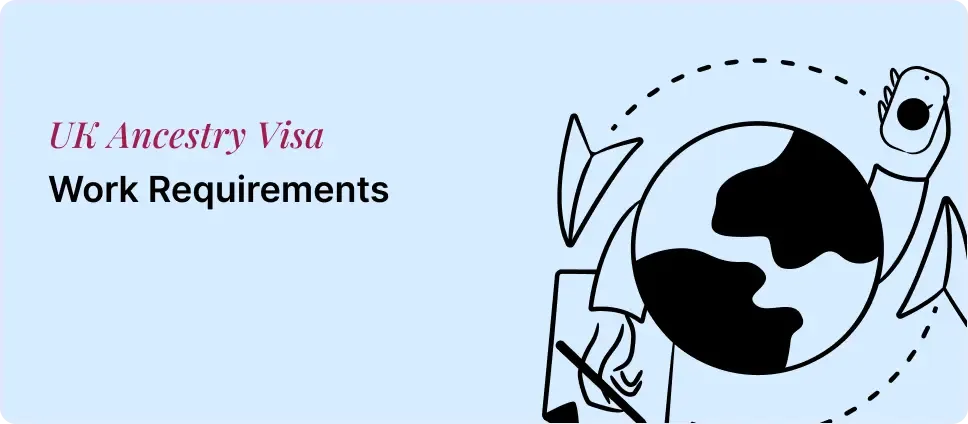
You are not required to be employed at the time of application; however, you must prove that you intend to secure, or have already secured, work in the UK. The work activities may include employment, self-employment or even voluntary work. In either situation, you need to show that you have adequate funds to support yourself in the UK without needing to claim benefits, whether or not you will have income from work.
This intention or plan to work can be demonstrated through:
- Previous work history
- Job search or applications
- A job offer
- A business plan if you intend to be self-employed or run your own business
- Similar documents for unpaid voluntary work, provided you meet the financial requirements
There are various ways to show that you are actively seeking employment or have successfully found a job. QC Immigration has experience with many applications, each with unique circumstances, and can guide the necessary documentation to prove your intention to work in the UK.
Financial Requirement
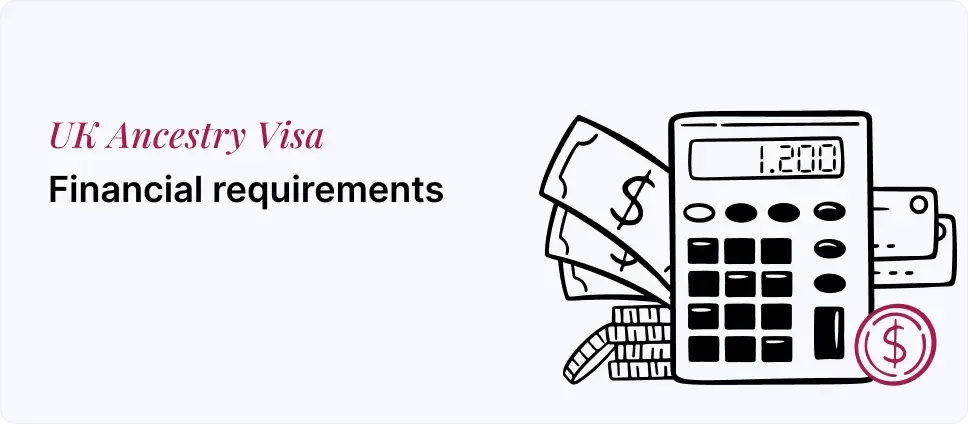
According to the Home Office guidelines for the Ancestry Visa, no specific amount of funds is required. However, you must prove you can support yourself and your family without relying on public funds.
You can rely on 'credible support' from a third party, such as a family member or friend, to meet this requirement, but you must provide evidence of this support.
Typical documents may include payslips, bank statements, letter of third party support, proof of income from employment, business or non-employment sources and more.
Accommodation
Long-term or temporary living arrangements may be accepted. Crucially, you need to demonstrate that there would be sufficient room(s) for the number of people living in that property, that meets the space requirements under the UK Housing Act.
Common evidence may include tenancy agreement, property ownership document, third party letter providing accommodation or booking of hotel or similar short-term accommodation.
Documentation Required
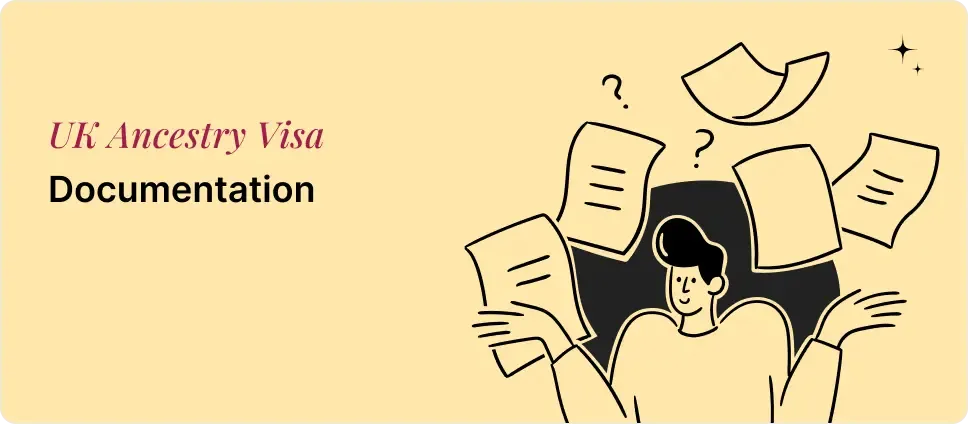
When making an Ancestry Visa application, the required documents can vary depending on personal circumstances, but will typically include:
- A current passport or another valid travel document.
- Evidence that you can and plan to work in the UK (e.g. previous work history, job search, job offers, business plan).
- Evidence that you can financially support yourself and any dependents, such as work documents or bank statement dated within 31 days of your application submission.
- Your full birth certificate (not the abbreviated version).
- The full birth certificate of your grandparent(s) on whom you are basing your Ancestry Visa claim (not abbreviated).
- The full birth certificate of the parent through whom you are claiming ancestry.
- Evidence of any name changes for your grandparents or parents.
- Legal adoption papers.
- Biometric information/biometric residence permit.
- Proof of accommodation arrangement
- Additional or bank statements show you have enough money to support your life in the UK.
- Tuberculosis test results are available if you come from a country that requires a TB test.
- If they intend to join you, marriage certificate, civil partnership certificate, birth certificate or other relationship evidence of your family members.
If you are unable to locate historic documents such as those belonging to grandparents, you may try ordering it from the Registry Office of the relevant country.
Any document not in English or Welsh must be accompanied by certified translation with:
- confirmation of an accurate translation of the original document
- date
- full name and signature of the translator or an authorised official of the translation company
- the translator or translation company’s contact details
Visa Fees
The application fee for obtaining a UK Ancestry Visa is £637.
NHS Healthcare Surcharge
You must pay an annual Immigration Health Surcharge (IHS) fee of £1,035 per year. This is charged in advance for 5 years.
Processing Times
You can apply for the UK Ancestry Visa up to 3 months before you plan to travel. Typically, you will receive a decision within 3 weeks if you apply outside the UK. However, processing may take longer if the Home Office needs more information or checks with other government departments. If this happens, you will receive a notification.
Using one of the priority services, which will vary depending on the country you are applying from, may allow you to get a faster decision.
How to Apply for the UK Ancestry Visa
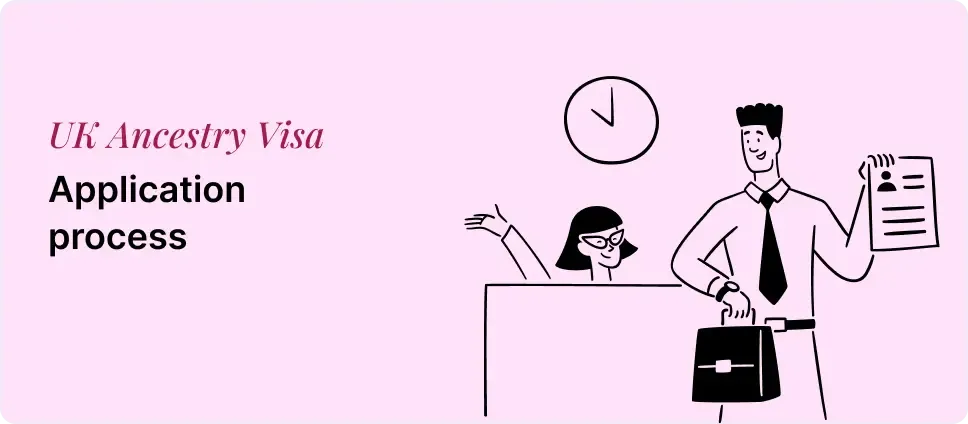
You must apply online for a UK Ancestry visa before you travel to the UK.
Successful Applications
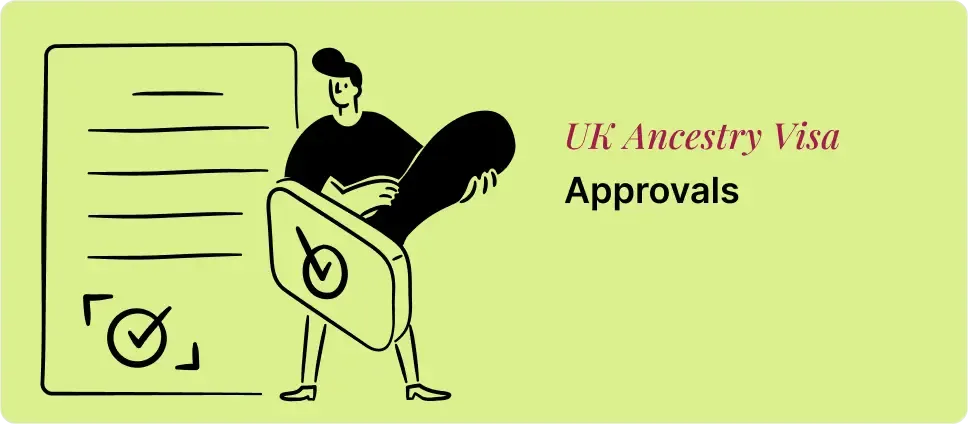
Once you have a successful application and hold a UK Ancestry Visa, you will be able to:
- Work, study, and bring your partner and children to the UK.
- Engage in part-time or full-time work, whether paid or voluntary, and be self-employed or employed by someone else.
However, you will not be able to:
- Claim public funds.
- Change or switch to this visa if you are already in the UK.
Refused UK Ancestry Visa
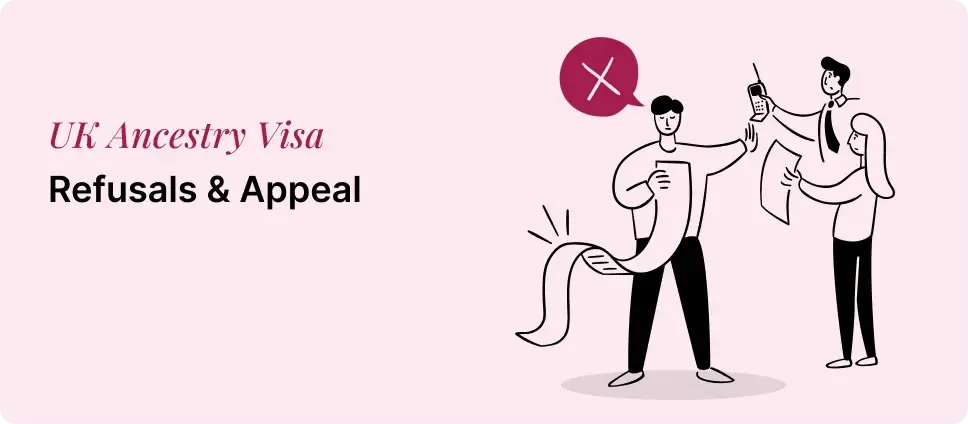
If your UK Ancestry Visa application is refused, you have no right to appeal. However, if you believe the initial decision needed to be corrected, you can request for an Administrative Review from UKVI. However, if your application was rejected because you didn't meet the eligibility criteria or needed the necessary documentation, it is unlikely the decision will be reversed.
QC Immigration can help you assess whether pursuing an administrative review is worthwhile, whether submitting a fresh application would be best, or exploring other appropriate visa routes.
With the future Indefinite Leave to Remain (ILR) application, it is also important to ensure you continue abiding by your Visa conditions and apply from the UK. If you struggle to meet certain requirements, seek help from a regulated Immigration Advisor in advance. Our QC Immigration team has a wealth of experience with complex Ancestry Visa cases, including clients who had exceeded the 180 days' absences limit for ILR due to exceptional circumstances such as medical, Covid-19 reasons etc..
Common Reasons for Refusal
In our experience, common reasons for refusal include:
- Unspent criminal convictions
- Non-payment of the relevant fee
- Lack of evidence confirming the job search in the United Kingdom
- Insufficient funds for living in the country
- Lack of evidence that the grandparent was born in the United Kingdom
- Submission of an incomplete set of documents or incorrect filling
- Inability to provide additional information requested by the Home Office
UK Ancestry Visa Extension
If you do not plan to apply for Indefinite Leave to Remain but wish to stay in the UK for over 5 years, you can extend your Ancestry Visa. This should be done before your current visa expires.
An Ancestry Visa extension grants you the right to stay in the UK for an additional 5 years. The visa can be extended unlimited times, provided you continue to meet the requirements.
Family members' Ancestry Visas will not be automatically extended. They need to apply for an extension with you or before their visa expires.
Get Help Applying for a UK Ancestry Visa
UK immigration laws are complex, and preparing for an Ancestry Visa requires a tailored approach based on each individual’s needs.
With years of experience, our team of legal experts can assist you in meeting the eligibility requirements and preparing an application that meets Home Office standards. We ensure your application has the best chance of being accepted by addressing all legal and financial requirements.
Our expertise helps you save time and reduces the risk of submitting an incomplete or non-compliant application, ensuring a smooth, efficient, and stress-free journey to achieving a UK Ancestry Visa.
Please get in touch with us online to book a consultation with one of our lawyers. Alternatively, you can phone us at 0203 637 8633 or email us at info@qc-immigration.com.

Qiyin Chuah
Founder & Principal
Qiyin is a globally-recognised immigration law expert:
- Hong Kong iMoney Magazine interview on Business Immigration from High Net Worth Individuals (HNWI), 2016
- ITV News interview about the Tier 2 Work Visa quota and NHS staff shortages, 2018
- The LegalTech Book: The Legal Technology Handbook for Investors, Entrepreneurs and FinTech Visionaries on the subject of ‘Humanise with Lawtech Lawyering’ (publisher: Wiley, 2020)
- Goldman Sachs 10,000 Small Businesses UK National cohort alumni, 2021
Qiyin is an industry expert with more than 15 years of legal experience. She graduated from the University of Manchester with an LL.B (Hons) in Law and an LLM in International Business Law. Initially trained in Corporate Law, she was inspired to pursue Immigration Law following a personal Visa experience. In 2011, Qiyin founded QC Immigration from frustration of the quality of client service in the market, plus the desire to build a healthier company culture. As a highly-skilled migrant herself, Qiyin fully understands the complicated circumstances and high expectations of our clients. She has proven victories in defending our clients’ businesses, children’s best interests, women’s rights, LGBT rights and challenging Home Office refusals. Our returning clients typically stay with us for over 6 years from obtaining their very first visa until British citizenship. Qiyin regularly provides mentoring, training and supervision to other lawyers in their pursuit for similar successes.